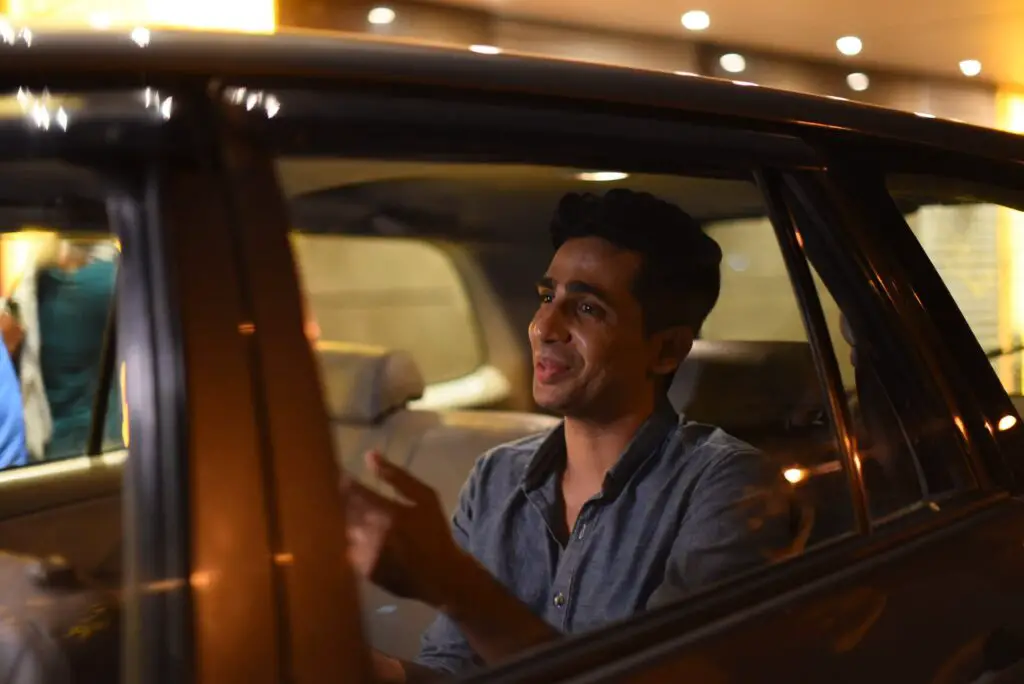In the hurly-burly of a vast cityscape, mesmerizing nightlife and luminescent roads, there are myriad stories of tragedy, romance, union and departure born and lost. Uncountable ‘goodbyes,’ ‘hellos’ and ‘so we meet again?’ are murmured in the nooks and corners of the city that welcomes scholars, students, workers, employees, doctors and models. The essence of a metro city lies in candid banter with taxi drivers, political conversations at tea stalls and greeting long-lost friends at queues of theatres, bus stands and local/metro ticket counters.
‘Dobara Alvida’, a Royal Stag Barrel Select Large Short Film, is one such story of incandescent yearning and unspoken desires. Featuring Gulshan Devaiah, Swara Bhaskar and Swapnil Kotriwar, the film takes its viewers along the road of belonging, possessing and letting go.
The film begins with a humdrum night presenting Gulshan as Kunal boarding a taxi booked from a cab service app, a feature that introduces the film universe as an ordinary course of the event, intending to directly get into the realm of relatability. Just like in an everyday cab, Kunal is cordially welcomed by the driver (Swapnil) and the trip begins.
Cab, here, becomes a carriage embarking on a journey of nostalgia for the protagonists. Long and close-up shots of the city, traffic, vehicles and night lights suggest the expanse and bustle of Mumbai city. And in a seemingly fortuitous turn of events, Swara enters the cab. When their eyes meet, they exchange an immediate glance of familiarity. The story moves slow but seems appropriately paced, as depicted through the characters’ expressions. It shows the way their lives almost halted for those forty minutes of the ride, driving them away from mundanity.
This is also metaphorically signified through the transition of scenic glimpses of the city from traffic on roads to empty serene streets illuminated with street lights. The conversation between these two estranged lovers while constantly overheard by the cab driver is what the film is all about. How the casual chat sparking from an awkward ‘how are you’ leads them down the memory lane, to moments of nostalgia, the quarrels and arguments and the eventual acceptance of a flawed mutual understanding, makes the film a symbol of all the unfulfilled love tales lingering in the heart of a city.
Although the film narrates the story explicitly through its dialogues, an emotional connection to it lies in the unsaid words hidden in the silences and pauses. How many times does an individual meet eyes with a long-lost friend, a forgotten acquaintance, or a distant beloved? Even if they do, what kind of a conversation would they possibly have? The words they’d choose to use and the wistful smiles they’d resist? This film is a momentary answer to that. Cab as a plot device is utilized to the fullest. It not only defines the commonality of metro urban spaces but acts as a catalyst in bringing hearts and stories together from different, unacquainted places of the city.
Gulshan as gentle and self-effacing and Swara as the feisty beloved truly justify their characters. Their performances feel real, as if drawing from personal experiences. Swapnil as the amiable cabbie holistically represents the face of cab drivers you and I often meet and cordially smile at. Their flawless engagement with the story still makes this film just a one-time watch.
Names like Gulshan Devaiah, Swara Bhaskar naturally augment expectations. Sadly, the film doesn’t live up. The narrative at times appears monotonous and fails to tap the full potential of the actors and a story that could have been. Cinematographically too, it leaves scope for more.
At 25-minute runtime, the film might feel a little stretched. Still, it’s hard not to be moved. It evokes emotion in classic Bollywood style reminding you of Naina’s ‘agar main tumhare saath do minute aur rahi toh mujhe tumse pyaar ho jayega… phir se!” from ‘Yeh Jawani Hai Deewani.’ It’s undeniable, though, that the film could have used more cinematic elements to expand the territory of the film universe and a stronger backstory could have pillared the end seamlessly.
Through the 25 minutes of the cab drive, director Shashank S. Singh conjures desires of holding back and letting go. Amidst a mellifluous song weaving lyrics about ‘goodbye and departure,’ the story culminates on a spoken ‘farewell’ unquestionably imbued with an unspoken ‘stay.’
By Alruba Sheikh
A writer by profession, Alruba is a postgraduate in Media Studies and is currently pursuing research in film representations and audience analysis

